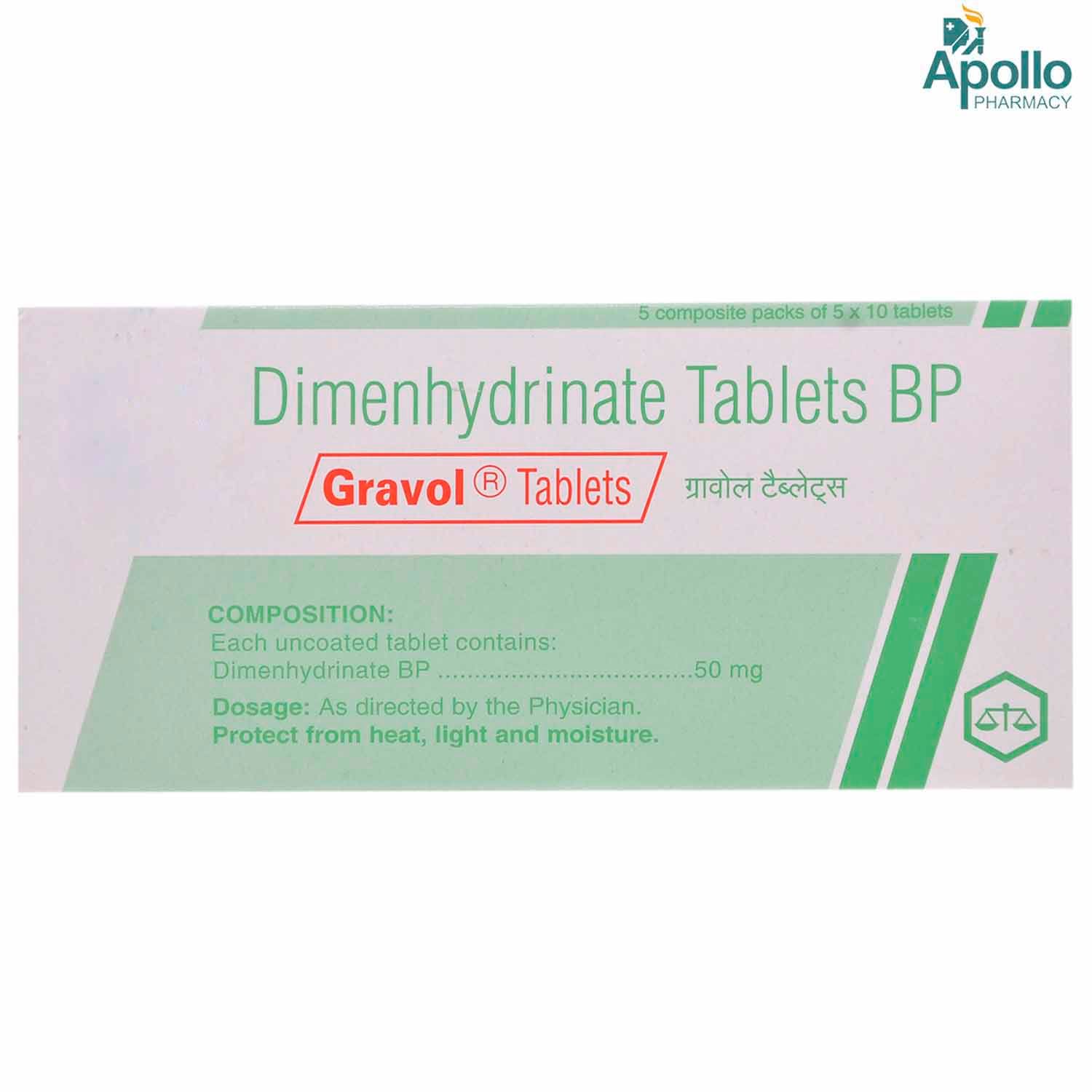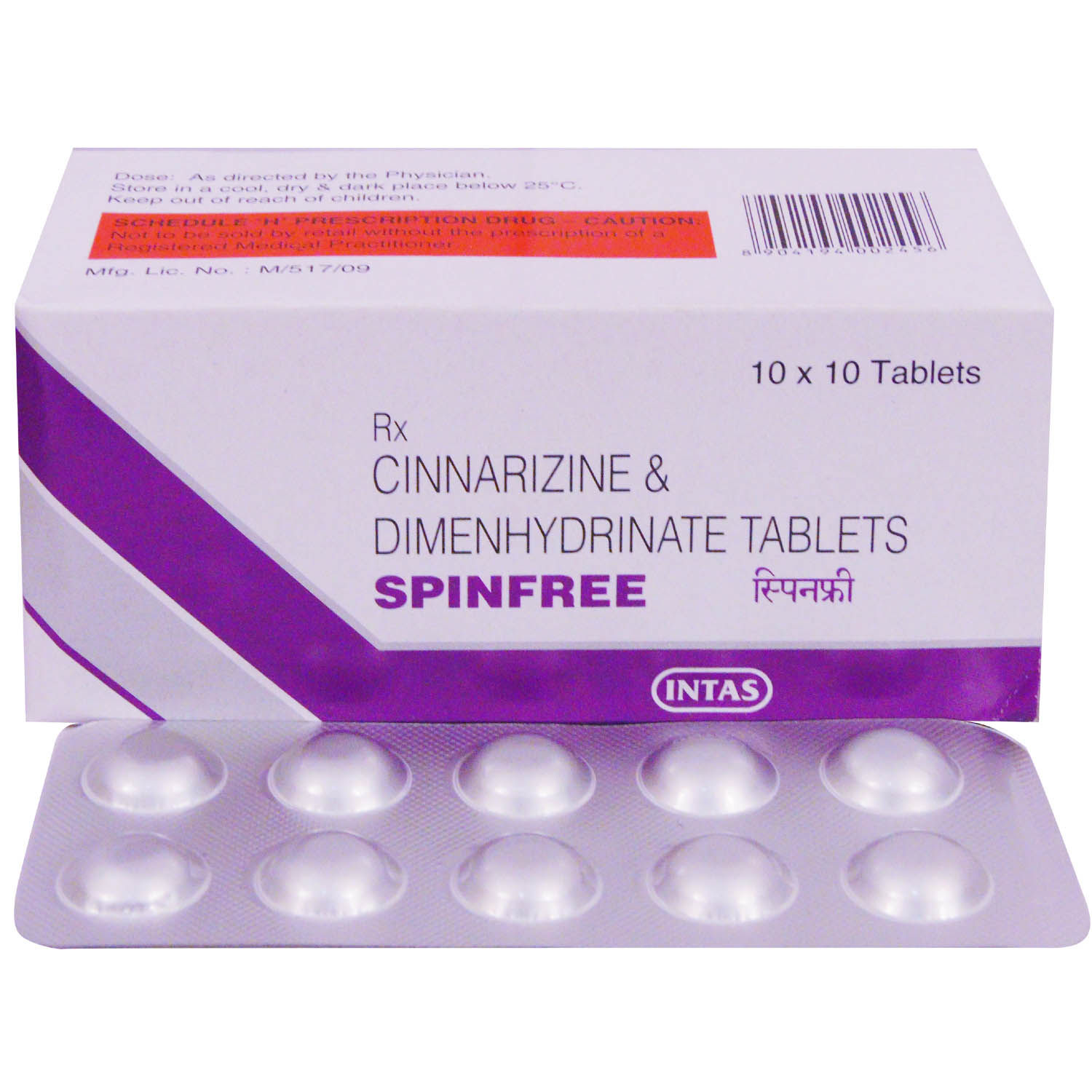Dimenhydrinate
About Dimenhydrinate
Dimenhydrinate belongs to a group of medicines called ‘antihistamine and anti-cholinergic agents’ used to prevent and treat nausea, vomiting and dizziness caused by motion sickness. It is used in the prophylaxis of postoperative vomiting, nausea and vomiting of radiation sickness, drug-induced nausea and vomiting, and symptomatic treatment of nausea, vomiting, and vertigo due to Ménière’s disease and other labyrinthine disturbances.
Dimenhydrinate contains ‘Dimenhydrinate’, which works by inhibiting the action of histamine H1 and muscarinic receptors. Thus, it prevents and treats nausea, vomiting, and dizziness.
In some cases, Dimenhydrinate may cause common side effects such as drowsiness, sleepiness, dizziness, muscle weakness, restlessness, and mood swings. Most of these side effects do not require medical attention and will resolve gradually over time. However, you are advised to talk to your doctor if the side effects persist or worsen.
Inform your doctor if you are pregnant or breastfeeding before receiving Dimenhydrinate. Avoid driving or operating machinery as Dimenhydrinate may cause sleepiness, drowsiness and dizziness. Do not consume alcohol while on treatment with Dimenhydrinate, as the effect of Dimenhydrinate can be altered or enhanced by alcohol. Keep your doctor informed about your health condition and medications to rule out any interactions/side effects.
Uses of Dimenhydrinate
Medicinal Benefits
Dimenhydrinate is an antihistamine, and anticholinergic agent used to prevent and treat nausea, vomiting, and dizziness caused by motion sickness. It is used to prevent postoperative vomiting, radiation sickness, nausea and vomiting, drug-induced nausea and vomiting, and the symptomatic treatment of nausea, vomiting, and vertigo caused by Ménière's disease and other labyrinthine disturbances. Dimenhydrinate contains the active ingredient 'Dimenhydrinate,' which inhibits the action of Histamine H1 and muscarinic receptors. As a result, it both prevents and treats nausea, vomiting, and dizziness.
Directions for Use
Storage
Side Effects of Dimenhydrinate
- Drowsiness
- Sleepiness
- Dizziness
- Muscle weakness
- Restlessness
- Mood swings
Drug Warnings
Do not take Dimenhydrinate if you are allergic to any of its components; if you have porphyria (problems with haemoglobin production), acute asthma attack, narrow-angle glaucoma, phaeochromocytoma (adrenal gland tumour), enlarged prostate gland, residual urine (urine retention in the bladder after passing water), or seizure disorder. Inform your doctor if you have heart rhythm disorders, potassium or magnesium deficiency, slow heartbeat, breathing problems, asthma, pyloric stenosis (narrowing of the stomach outlet), heart, kidney, or liver problems. Inform your doctor if you are pregnant or breastfeeding. Dimenhydrinate is not recommended for children below 2 years.
Drug Interactions
Drug-Drug Interactions: Dimenhydrinate may interact with CNS depressants, drugs with anticholinergic effects, ototoxic drugs, antihistamines, neuroleptics, antimalarials, diuretics, antibiotics (erythromycin), anti-arrhythmic medicines (quinidine, amiodarone).
Drug-Food Interactions: No interactions found/established.
Drug-Disease Interaction: Inform your doctor if you have porphyria (problems with haemoglobin production), acute asthma attack, narrow-angle glaucoma, phaeochromocytoma (adrenal gland tumour), enlarged prostate gland, residual urine (urine retention in the bladder after passing water), or seizure disorder.
Drug-Drug Interactions Checker List:
Safety Advice

Alcohol
unsafeAvoid consumption of alcohol while taking Dimenhydrinate, as the effect of Dimenhydrinate can be altered or enhanced by alcohol.

Pregnancy
cautionInform your doctor if you are pregnant; your doctor will prescribe only if the benefits outweigh the risks. Dimenhydrinate is not recommended for use during the third trimester as it may have the potential to stimulate preterm uterus contractions.

Breast Feeding
cautionDimenhydrinate may be excreted in human milk. Inform your doctor if you are breastfeeding. Your doctor will prescribe only if the benefits outweigh the risks.

Driving
unsafeAvoid driving or operating machinery as Dimenhydrinate may cause dizziness, drowsiness and sleepiness.

Liver
cautionIf you have liver problems, inform your doctor before receiving Dimenhydrinate. Your doctor may adjust the dose or prescribe a suitable alternative based on your condition.

Kidney
cautionIf you have kidney problems, inform your doctor before receiving Dimenhydrinate. Your doctor may adjust the dose or prescribe a suitable alternative based on your condition.

Children
cautionDimenhydrinate is not recommended for children below 2 years. Dimenhydrinate should be used with caution in children below 6 years.
Habit Forming
Diet & Lifestyle Advise
- Eat smaller meals more often.
- Drink fluids to stay hydrated.
- Avoid solid foods until the vomiting stops.
- Avoid foods that might cause stomach upset.
- Take ample rest. Avoid any activity immediately after eating.
- Consume plain, light foods such as bread and biscuits.
- Avoid food with strong flavours and fried food.
- Ginger tea might help in proper digestion.
Special Advise
Inform your doctor that you are on treatment with Dimenhydrinate if you are undergoing any allergy tests, as false-negative test results are possible.
Patients Concern
Disease/Condition Glossary
Nausea/Vomiting: Nausea is an uneasy feeling in which the person feels an urge to vomit, whereas vomiting is an uncontrollable reflex that expels the contents of the stomach through the mouth. Nausea and vomiting may occur separately or together. The common causes include motion sickness, emotional stress, indigestion, food poisoning, high fever, overeating, or medical procedures.
Motion sickness: It is an illness caused due to motion during travelling by car, plane, boat, or train. The body’s sensory organs send mixed signals to the brain, causing dizziness, light-headedness, nausea or vomiting. Symptoms include nausea, vomiting, fatigue, uneasiness, dizziness, and trouble maintaining/loss of balance.
FAQs
Dimenhydrinate belongs to a group of medicines called antihistamine and anti-cholinergic agents used to prevent and treat nausea, vomiting, dizziness, and motion sickness.
Dimenhydrinate works by inhibiting the action of Histamine H1 and muscarinic receptors. Thus, prevents and treats nausea, vomiting, and dizziness.
Dry mouth could be a side effect of Dimenhydrinate. Limiting caffeine intake, avoiding smoking and, drinking water regularly, chewing sugar-free gum/candy might stimulate saliva, thereby preventing drying of the mouth.
Dimenhydrinate may be used in the symptomatic treatment of nausea, vomiting, and vertigo (spinning sensation) due to Ménière’s disease (an inner ear disorder that causes episodes of vertigo).
If you are taking or have taken monoamine oxidase inhibitors (MAOI) in the last 14 days, inform your doctor as it may intensify and prolong anticholinergic effects. However, consult your doctor before taking other medicines after taking Dimenhydrinate.
Taking anti-hypertensives (medicines used to treat high blood pressure) with Dimenhydrinate may cause increased tiredness. Consult your doctor before taking anti-hypertensive medicines with Dimenhydrinate.








